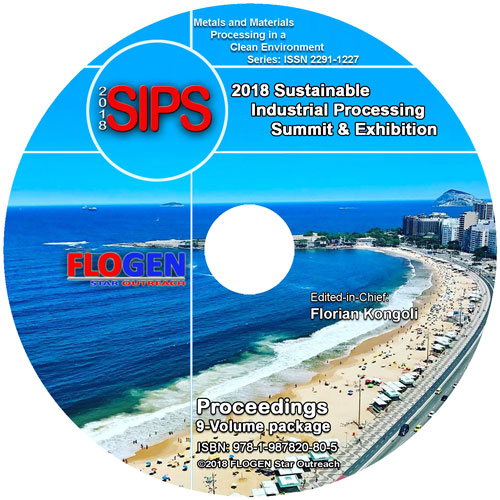2018-Sustainable Industrial Processing Summit
SIPS2018
Volume 6. New and Advanced Materials and Technologies
| Editors: | F. Kongoli, F. Marquis, P. Chen, T. Prikhna, N. Chikhradze |
| Publisher: | Flogen Star OUTREACH |
| Publication date: | 23 December 2018 |
| Pages: | 392 pages |
| ISBN: | 978-1-987820-92-8 |
| ISSN: | 2291-1227 (Metals and Materials Processing in a Clean Environment Series) |

CD shopping page
Self-regulation of Living Spaces Through Material Multi-functionality
Tahir Cagin1; Ergun Akleman2; terry creasy2; Negar Kalantar2; Zofia Rybkowski3;1TEXAS A&M UNIVERSITY, College Station, United States; 2TEXAS A&M UNIVERSITY, college station, United States; 3TEXAS A&M UNIVERSITY, college Station, United States;
Type of Paper: Regular
Id Paper: 255
Topic: 43
Abstract:
We envision living spaces and structures that could self-regulate their comfort and utility levels such as temperature, light, or air purity, in response to cyclic external environmental changes occurring in nature. The concept of self-regulation is natural for biological structures such as plants, which can regulate their internal parameters that do not require a centralized control. With current advances in materials science and engineering focusing on development of multi-functional materials, design and control of materials' microstructures, as well as advances in architectural design of functional units and architectured materials, it has become possible to construct self-regulatory structures without sensors or centralized control. By using materials that can self-modify their form and morphology in response to localized environmental cues such as gradient changes in temperature, vapor pressure, mechanical pressure, and pH, there exists the potential to modify permeability of air, water, and heat transfer across a structure's skin, as well as modulate light and other comfort related parameters. The design principle underscoring this perspective is to apply non-equilibrium statistical thermodynamics, which governs the behavior of dynamic systems as a function of field gradients; eg.. temperature gradient leading to energy flow, concentration gradients montioring mass flow and potential gradient guiding eurrent flow. The level and treshold of the flows is guided by the materials response functions — thermal conductivity, viscosity, resistivity, and other coupled transport coefficients. There are many existing highly active functional materials, such as shape memory alloys, bi-metallic strips, stimuli-responsive polymers, dendritic or star polymers, abundant phase changing materials and piezoelectric materials, that can provide such self-regulatory behavior [1-5]. We will describe various materials systems that provide opportunities in design materials and material systems for construction of self-regulating structures.
Keywords:
Energy; Energy efficiency; Environment; Nanomaterials; New and advanced materials; Renewable energy; Sustainable development;References:
[1] J.B. Haskins, A. Kinaci, T. Çağın, “Molecular Dynamics Simulations of Piezoelectric Materials for Energy Harvesting Applications,†Materials Science Forum 792, 54-64 (2014).[2] S. Ozdemir Kart, M. Uludogan, I. Karaman, and T. Çağın, “DFT Studies on Structure, Mechanics and Phase Behavior of Magnetic Shape Memory Alloys: Ni2MnGa†Phys. Stat. Sol. (a) 205, 1026-35 (2008).
[3] T. Çağın, G. F. Wang, R. Martin, N. Breen, W. A. Goddard, “Molecular Modeling of dendrimers for nanoscale applications,†Nanotech. 11, 77-84 (2000).
[4] A. Chakrabarty, T. Çağın, “Thermo-mechanical Properties of a piezoelectric polyimide carbon nanotube composite: Assessment of Composite Theories,†Comp. Mater. Sci. 92, 185-191 (2014).
[5] P. K. Maiti, T. Çağın, S-T Lin, and W. A. Goddard, III, Effect of Solvent and pH on the Structure of PAMAM Dendrimers, Macromol. 38, 979-991 (2005).